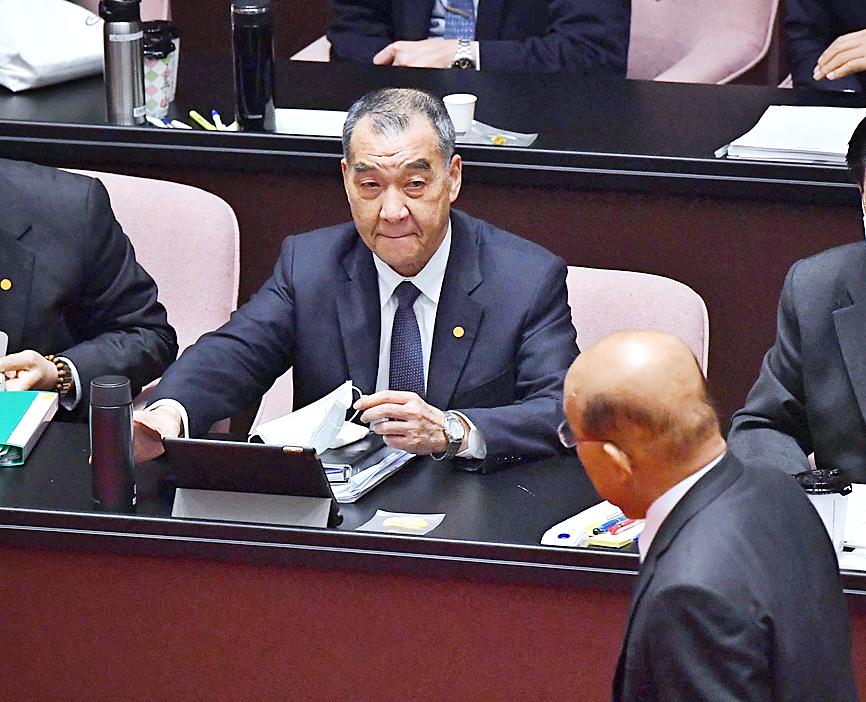Minister of National Defense Chiu Kuo-cheng (邱國正) yesterday reaffirmed the US’ approval of export licenses for “red zone” military technologies used in Taiwan’s indigenous submarine program, which he said has not changed since its initial approval in December last year.
The Ministry of National Defense has divided required components into three categories: “red” for imported technologies that the nation is unable to research and develop, or manufacture itself; “yellow” for parts that are difficult to obtain, but can be produced locally; and “green” for components that can be manufactured locally.
Sonar systems, diesel engines, torpedo and missile systems, and an integrated combat system have all been categorized as “red,” according to the ministry.

Photo: CNA
Ministry officials said that the program is progressing as expected, with a scheduled prototype launch in 2024 and vessel delivery in 2025 remaining unchanged.
Construction of the nation’s first indigenous submarine began last year. Once completed, the vessels are expected to replace the navy’s aging Dutch-made Zwaardvis-class submarines, the Hai Lung (海龍) and the Hai Hu (海虎), which entered service in 1987 and 1988 respectively.
Chiu told the media that the ministry would carry on with the program, and ensure that all the details are in accordance with the law and procedures.
People should not interpret the announcement as a warming of Taiwan-US ties, said.
“If a sale has been approved and is procedurally sound, there should not be anything overtly political about it,” Chiu added.
However, the ministry said a delivery date cannot be definitively guaranteed due to the COVID-19 pandemic.
The announcement makes the Chinese Nationalist Party’s (KMT) proposed budget freeze on the program in December last year null.
The KMT had cited concerns that export permits for critical components for construction of the submarines would not be granted and the wait for export license permission could mean that the project would not meet its deadline.
Additional reporting by Peng Wan-hsin

The Ministry of Education (MOE) is to launch a new program to encourage international students to stay in Taiwan and explore job opportunities here after graduation, Deputy Minister of Education Yeh Ping-cheng (葉丙成) said on Friday. The government would provide full scholarships for international students to further their studies for two years in Taiwan, so those who want to pursue a master’s degree can consider applying for the program, he said. The fields included are science, technology, engineering, mathematics, semiconductors and finance, Yeh added. The program, called “Intense 2+2,” would also assist international students who completed the two years of further studies in

Former president Tsai Ing-wen (蔡英文) departed for Europe on Friday night, with planned stops in Lithuania and Denmark. Tsai arrived at Taiwan Taoyuan International Airport on Friday night, but did not speak to reporters before departing. Tsai wrote on social media later that the purpose of the trip was to reaffirm the commitment of Taiwanese to working with democratic allies to promote regional security and stability, upholding freedom and democracy, and defending their homeland. She also expressed hope that through joint efforts, Taiwan and Europe would continue to be partners building up economic resilience on the global stage. The former president was to first

The brilliant blue waters, thick foliage and bucolic atmosphere on this seemingly idyllic archipelago deep in the Pacific Ocean belie the key role it now plays in a titanic geopolitical struggle. Palau is again on the front line as China, and the US and its allies prepare their forces in an intensifying contest for control over the Asia-Pacific region. The democratic nation of just 17,000 people hosts US-controlled airstrips and soon-to-be-completed radar installations that the US military describes as “critical” to monitoring vast swathes of water and airspace. It is also a key piece of the second island chain, a string of

Taiwan will now have four additional national holidays after the Legislative Yuan passed an amendment today, which also made Labor Day a national holiday for all sectors. The Chinese Nationalist Party (KMT) and Taiwan People’s Party (TPP) used their majority in the Legislative Yuan to pass the amendment to the Act on Implementing Memorial Days and State Holidays (紀念日及節日實施辦法), which the parties jointly proposed, in its third and final reading today. The legislature passed the bill to amend the act, which is currently enforced administratively, raising it to the legal level. The new legislation recognizes Confucius’ birthday on Sept. 28, the